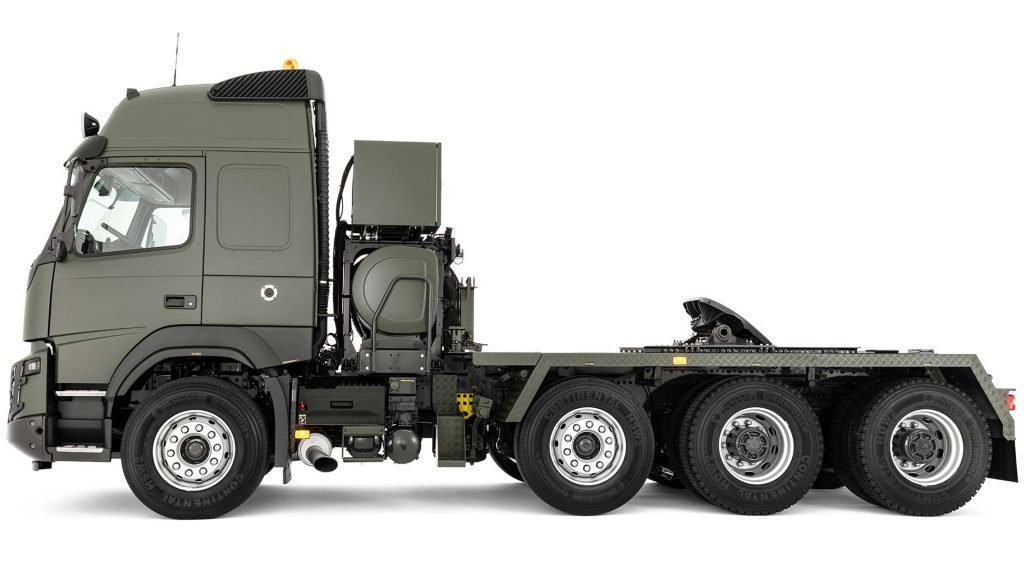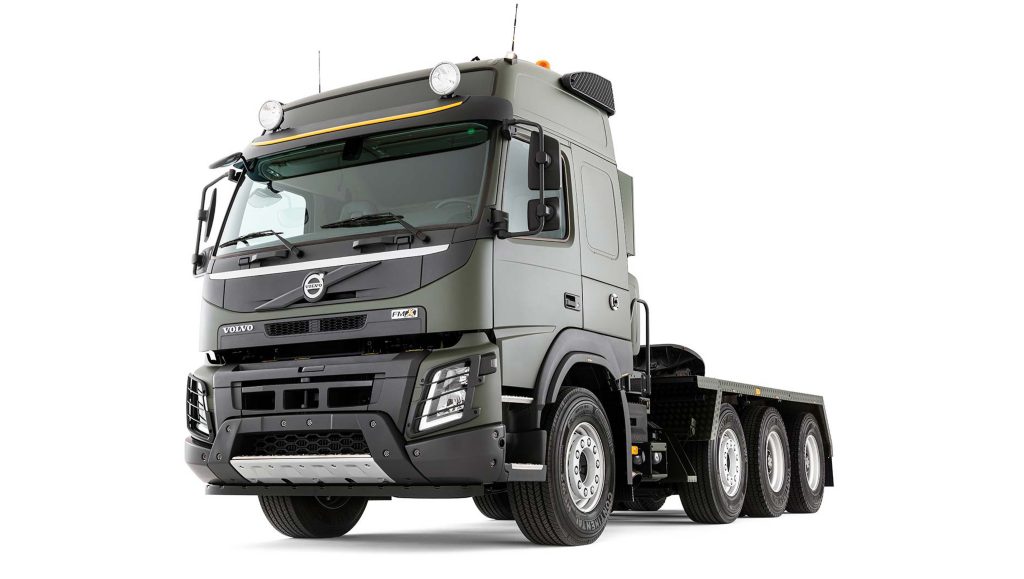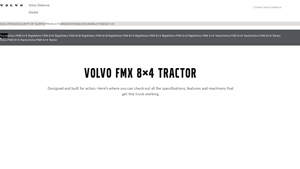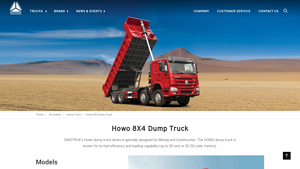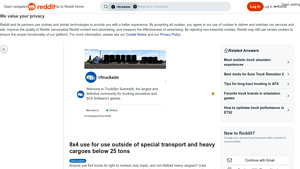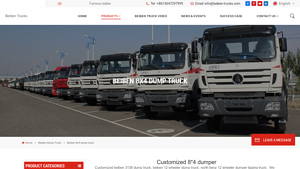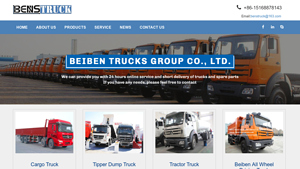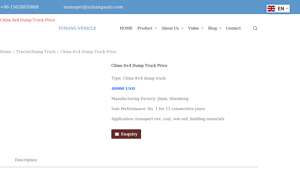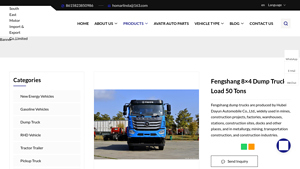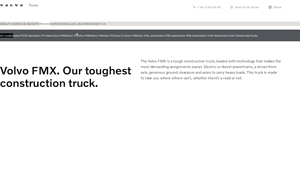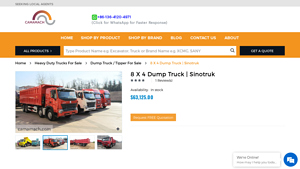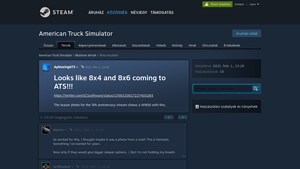Introduction: Navigating the Global Market for 8*4 Truck
In the competitive landscape of international logistics, sourcing an 84 truck that meets diverse operational demands can be a daunting challenge for B2B buyers. Whether transporting heavy loads across rugged terrains in Africa or maneuvering through urban environments in South America, the right truck is crucial for efficiency and reliability. This comprehensive guide delves into the various types of 84 trucks available, their specific applications, and the critical factors to consider during the supplier vetting process.
From understanding the nuances of performance specifications to evaluating cost-effectiveness and after-sales support, this resource equips international buyers with the knowledge needed to make informed purchasing decisions. Each section is designed to address the unique needs of markets in regions such as the Middle East and Europe, including countries like Saudi Arabia and Brazil, where infrastructure and operational challenges can vary significantly.
By leveraging insights from leading manufacturers and expert analyses, this guide empowers buyers to navigate the complexities of the global market for 8*4 trucks. It aims to ensure that your investment not only meets current logistical requirements but also adapts to future demands, enhancing fleet versatility and operational efficiency.
Understanding 8*4 Truck Types and Variations
| Type Name | Key Distinguishing Features | Primary B2B Applications | Brief Pros & Cons for Buyers |
|---|---|---|---|
| 8×4 Dump Truck | High payload capacity (up to 30 tons), robust construction | Mining, construction, waste management | Pros: High durability, excellent load capacity. Cons: May have higher fuel consumption. |
| 8×4 Mixer Truck | Specialized for transporting concrete, rotating drum | Construction, infrastructure projects | Pros: Ensures fresh concrete delivery. Cons: Limited to specific applications. |
| 8×4 Tractor Truck | Versatile for towing trailers, strong engine performance | Logistics, heavy haulage | Pros: Multi-purpose, adaptable configurations. Cons: Requires skilled drivers for optimal use. |
| 8×4 Water Tank Truck | Equipped with large tanks for water transport | Agriculture, firefighting, construction | Pros: Essential for remote locations, efficient. Cons: Heavy when fully loaded, which may affect maneuverability. |
| 8×4 Cargo Truck | Flatbed or enclosed for diverse cargo types | General freight, logistics | Pros: Versatile for various goods, customizable. Cons: Less specialized than other types. |
What are the Characteristics and Applications of 8×4 Dump Trucks?
8×4 dump trucks are designed primarily for heavy-duty applications, particularly in mining and construction sectors. With a payload capacity of up to 30 tons, they are built to handle the rigorous demands of transporting bulk materials like gravel, sand, and debris. Their robust construction ensures durability in harsh environments, making them a reliable choice for companies engaged in large-scale projects. When considering a purchase, buyers should evaluate fuel efficiency and potential maintenance costs, as these trucks can consume more fuel compared to lighter models.
How Do 8×4 Mixer Trucks Stand Out in the Construction Industry?
8×4 mixer trucks are specialized vehicles designed to transport and mix concrete on-site. Equipped with a rotating drum, they ensure that the concrete remains fresh and workable during transit. These trucks are essential for construction and infrastructure projects where timely delivery of concrete is critical. B2B buyers should consider the truck’s mixing capacity and operational reliability, as downtime can severely impact project timelines. Additionally, understanding the maintenance requirements is crucial for maintaining optimal performance.
What Benefits Do 8×4 Tractor Trucks Offer for Logistics?
8×4 tractor trucks are versatile vehicles ideal for towing trailers and transporting heavy loads across long distances. Their powerful engines and adaptability make them suitable for a variety of logistics applications, including heavy haulage. Buyers should focus on the truck’s towing capacity and the availability of customizable configurations to meet specific transport needs. However, it is important to consider the necessity for skilled drivers, as the operation of these trucks can be complex and requires expertise.
Why Choose 8×4 Water Tank Trucks for Remote Operations?
8×4 water tank trucks are designed to carry large volumes of water, making them indispensable for agricultural purposes, firefighting, and construction sites in remote areas. Their capacity allows for efficient water supply in locations where traditional sources may be limited. When purchasing, B2B buyers should assess the tank’s capacity and the truck’s overall weight, as fully loaded trucks can be challenging to maneuver. Additionally, understanding the truck’s pumping capabilities can enhance its utility in various applications.
How Do 8×4 Cargo Trucks Provide Versatility in Freight Transport?
8×4 cargo trucks are designed for general freight transport, offering a flatbed or enclosed body for diverse cargo types. Their versatility makes them suitable for a wide range of industries, from logistics to retail. Buyers should consider the truck’s payload capacity and customization options to accommodate different cargo requirements. While these trucks provide flexibility, they may not be as specialized as other types, which could impact efficiency in specific applications.
Key Industrial Applications of 8*4 Truck
| Industry/Sector | Specific Application of 8*4 Truck | Value/Benefit for the Business | Key Sourcing Considerations for this Application |
|---|---|---|---|
| Construction | Heavy Material Transport | Efficient transportation of heavy loads, reducing downtime and increasing project efficiency. | Load capacity, durability, and fuel efficiency are critical. |
| Mining | Mineral and Ore Hauling | Ability to handle rough terrains and heavy loads, ensuring timely delivery of materials. | Engine performance, tire specifications, and maintenance support. |
| Waste Management | Waste Collection and Disposal | Streamlined operations for waste removal, contributing to cleaner urban environments. | Payload capacity, ease of maintenance, and after-sales support. |
| Agriculture | Bulk Transport of Agricultural Products | Facilitates transportation of large quantities of produce, enhancing supply chain efficiency. | Versatility for different payloads and compatibility with agricultural attachments. |
| Oil & Gas | Equipment and Material Transport | Reliable logistics for transporting heavy equipment and materials to remote sites. | Robustness, fuel efficiency, and adaptability to extreme conditions. |
How is the 8*4 Truck Utilized in the Construction Industry?
In the construction sector, 8*4 trucks are pivotal for transporting heavy materials such as concrete, steel, and aggregates. Their high load capacity and robust build allow for efficient movement of essential supplies to job sites, minimizing delays. For international buyers, especially in regions like Africa and the Middle East, sourcing trucks with high durability and fuel efficiency is crucial due to challenging road conditions and the need for cost-effective operations.
What Role Does the 8*4 Truck Play in Mining Operations?
Mining operations require reliable transportation solutions for moving minerals and ores from extraction sites to processing facilities. The 8*4 truck excels in navigating rough terrains and carrying substantial loads, addressing the critical need for timely material delivery. Buyers from South America, where mining is a significant industry, should consider trucks with enhanced engine performance and strong tire specifications to withstand the demanding conditions of mining sites.
How Does the 8*4 Truck Enhance Waste Management Services?
In waste management, 8*4 trucks are employed for efficient waste collection and disposal. Their design allows for significant payload capacities, which streamlines operations in urban environments. For B2B buyers in Europe, where sustainability is a priority, sourcing trucks that are easy to maintain and equipped with advanced safety features can improve service reliability and compliance with environmental regulations.
In What Ways Does the 8*4 Truck Support Agricultural Logistics?
The agricultural sector benefits from the versatility of 8*4 trucks, which are used for transporting bulk agricultural products like grains and fertilizers. Their ability to carry large volumes enhances supply chain efficiency, particularly in regions like Brazil, where agriculture is a key economic driver. Buyers should focus on trucks that offer adaptability for various payloads and compatibility with agricultural attachments to maximize operational effectiveness.
How is the 8*4 Truck Essential in the Oil & Gas Industry?
In the oil and gas sector, 8*4 trucks are vital for transporting equipment and materials to remote drilling sites. Their robustness and fuel efficiency are essential for navigating difficult terrains commonly found in this industry. International buyers, particularly from the Middle East, must consider trucks that can operate in extreme conditions and provide reliable performance to ensure uninterrupted logistics in critical operations.
3 Common User Pain Points for ‘8*4 Truck’ & Their Solutions
Scenario 1: Navigating Tough Terrain with Heavy Loads
The Problem: B2B buyers in industries such as construction or mining often face the challenge of transporting heavy loads across rugged terrains. The ability of the truck to maneuver through uneven surfaces, steep inclines, and soft ground conditions is crucial. For instance, a buyer may find that their current fleet struggles to deliver materials on-site due to the limitations of their vehicles, leading to project delays and increased costs.
The Solution: Opt for an 84 truck designed specifically for challenging environments, like the Volvo FMX or Howo 84 dump truck. These models feature advanced technologies such as Automatic Traction Control and a robust drivetrain that enhances their ability to navigate difficult terrains. B2B buyers should prioritize vehicles with adaptive features like power launch and hill start aid, which simplify operation on inclines. Additionally, engaging with manufacturers that offer customization options can ensure that the truck meets specific operational needs, such as enhanced ground clearance or specialized tires for off-road conditions. Regular training for operators on utilizing these features can further improve efficiency and safety during transportation.
Scenario 2: Managing Fuel Efficiency and Operating Costs
The Problem: With fluctuating fuel prices, B2B buyers must ensure that their fleet operates efficiently to control costs. An 8*4 truck that consumes excessive fuel can significantly impact the overall budget, particularly for businesses operating in remote areas where fuel supply is irregular. This financial strain can deter companies from expanding their operations or investing in new projects.
The Solution: To mitigate fuel costs, buyers should focus on 8*4 trucks that incorporate fuel-efficient technologies. For instance, models like the SINOTRUK Howo come equipped with optimized engines that provide a good balance between power and fuel consumption. Buyers should assess the drivetrain efficiency and opt for trucks with features such as cruise control and engine braking systems that help conserve fuel. Additionally, implementing a telematics system can track fuel usage and vehicle performance, allowing businesses to identify inefficiencies and optimize routes. Regular maintenance schedules and driver training on fuel-efficient driving techniques can further enhance the operational economy of the fleet.
Scenario 3: Ensuring Reliable After-Sales Support and Parts Availability
The Problem: In the B2B environment, downtime due to vehicle maintenance or repairs can lead to significant losses. Buyers may encounter difficulties in sourcing spare parts or receiving timely after-sales service, particularly in regions with limited access to manufacturer support. This situation can exacerbate operational challenges, leading to project delays and increased costs.
The Solution: When purchasing an 8*4 truck, it is essential for buyers to thoroughly evaluate the manufacturer’s after-sales support and parts availability. Partnering with established brands like Beiben or Volvo, known for their robust service networks, can ensure that spare parts are readily available, even in remote locations. B2B buyers should inquire about the manufacturer’s warranty, service agreements, and the availability of local dealerships. Establishing a proactive maintenance plan that includes regular inspections and servicing can also minimize unexpected breakdowns. Additionally, creating a relationship with a local parts supplier who can stock essential components will enhance operational resilience and reduce downtime. By prioritizing reliable support, businesses can maintain their fleet’s performance and longevity, ultimately safeguarding their investments.
Strategic Material Selection Guide for 8*4 Truck
When selecting materials for 84 trucks, particularly in the context of international B2B markets such as Africa, South America, the Middle East, and Europe, it is crucial to consider the specific properties, advantages, and limitations of each material. The following analysis covers four common materials used in the manufacturing of 84 trucks: steel, aluminum, composite materials, and rubber.
What Are the Key Properties of Steel in 8*4 Truck Manufacturing?
Steel is the most widely used material in truck manufacturing due to its strength and durability. It typically exhibits high tensile strength, excellent fatigue resistance, and good impact properties. Steel is also highly resistant to deformation under heavy loads, making it ideal for structural components of 8*4 trucks.
Pros and Cons:
Steel’s primary advantage is its cost-effectiveness and availability, especially in regions with established steel industries. However, it is heavier than other materials, which can negatively impact fuel efficiency. Additionally, steel is susceptible to corrosion if not properly treated, which can be a concern in humid or saline environments.
Impact on Application:
Steel is compatible with various media, including fuels and lubricants, but care must be taken to prevent corrosion in harsh environments.
Considerations for International Buyers:
B2B buyers should consider compliance with international standards such as ASTM for materials. In regions like Saudi Arabia and Brazil, where harsh weather conditions are prevalent, choosing corrosion-resistant steel grades can enhance longevity.
How Does Aluminum Enhance Performance in 8*4 Trucks?
Aluminum is increasingly used in truck manufacturing due to its lightweight properties and resistance to corrosion. It is particularly beneficial for components like body panels and frames, where reducing weight can improve fuel efficiency and payload capacity.
Pros and Cons:
The key advantage of aluminum is its excellent strength-to-weight ratio, which allows for better fuel economy. However, aluminum can be more expensive than steel, and its manufacturing processes can be more complex, often requiring specialized welding techniques.
Impact on Application:
Aluminum is compatible with various fluids and is less prone to rust, making it suitable for trucks operating in diverse climates.
Considerations for International Buyers:
Buyers should be aware of the specific aluminum grades that comply with international standards, as well as the potential need for specialized maintenance.
What Role Do Composite Materials Play in 8*4 Truck Design?
Composite materials, such as fiberglass and carbon fiber, are becoming more popular in the automotive sector due to their lightweight and high-strength characteristics. These materials are often used in non-structural components and body panels.
Pros and Cons:
The primary advantage of composites is their ability to reduce weight significantly while maintaining strength. However, they can be costly and require specialized manufacturing techniques, which may not be readily available in all regions.
Impact on Application:
Composites are generally resistant to corrosion and can withstand a variety of environmental conditions, making them suitable for trucks operating in diverse climates.
Considerations for International Buyers:
B2B buyers should evaluate the availability of composite materials and the expertise of local manufacturers in working with these materials, particularly in developing markets.
How Important is Rubber in 8*4 Truck Applications?
Rubber is a critical material in truck manufacturing, primarily used for tires and seals. It provides excellent traction and shock absorption, essential for heavy-duty applications.
Pros and Cons:
Rubber’s main advantage is its ability to withstand various environmental conditions while providing good grip and durability. However, it can degrade over time due to exposure to UV rays and extreme temperatures, necessitating regular maintenance and replacement.
Impact on Application:
Rubber is compatible with a wide range of media, including oils and fuels, making it suitable for various truck applications.
Considerations for International Buyers:
International buyers should ensure that rubber components meet local standards for durability and performance, particularly in regions with extreme weather conditions.
Summary Table of Material Selection for 8*4 Trucks
| Material | Typical Use Case for 8*4 Truck | Key Advantage | Key Disadvantage/Limitation | Relative Cost (Low/Med/High) |
|---|---|---|---|---|
| Steel | Structural components | Cost-effective and durable | Heavy and prone to corrosion | Low |
| Aluminum | Body panels and frames | Lightweight and corrosion-resistant | Higher cost and complex to manufacture | High |
| Composite | Non-structural components | Significant weight reduction | Expensive and requires specialized manufacturing | High |
| Rubber | Tires and seals | Excellent traction and shock absorption | Degrades over time | Medium |
This guide provides a comprehensive overview of material selection for 8*4 trucks, enabling international B2B buyers to make informed decisions based on specific applications and regional considerations.
In-depth Look: Manufacturing Processes and Quality Assurance for 8*4 Truck
What Are the Key Manufacturing Processes for 8*4 Trucks?
The manufacturing of 8*4 trucks involves several critical stages that ensure the final product meets industry standards and customer expectations. Understanding these processes is essential for B2B buyers looking to source reliable vehicles.
1. Material Preparation: What Materials Are Used in 8*4 Truck Manufacturing?
The first step in the manufacturing process is the preparation of materials. High-quality steel and alloy materials are predominantly used in the chassis and body components to ensure durability and strength. For instance, manufacturers often utilize phosphate-coated and powder-painted Swedish steel to enhance corrosion resistance and longevity.
Additionally, components such as the drivetrain, engine, and suspension systems are sourced from specialized suppliers. These parts must comply with international quality standards, ensuring that they can withstand the rigorous demands of heavy-duty applications.
2. Forming: How Are Key Components Shaped?
Once materials are prepared, the next stage is forming. This involves techniques such as stamping, bending, and welding to create the truck’s frame and body. Advanced technologies like CNC (Computer Numerical Control) machining are often employed for precision in cutting and shaping components.
For example, the chassis is typically fabricated using laser cutting and robotic welding techniques, which provide both accuracy and efficiency. This step is crucial as it lays the foundation for the truck’s structural integrity and performance.
3. Assembly: What Does the Assembly Process Entail?
After forming, components move to the assembly line. Here, the various parts, including the engine, drivetrain, axles, and body, are brought together. The assembly process may employ modular techniques, allowing for flexibility in production and the ability to customize configurations based on client specifications.
During assembly, manufacturers often use a combination of manual labor and automation. Skilled workers oversee the installation of critical components while robotics assist in repetitive tasks, enhancing efficiency and reducing the risk of human error.
4. Finishing: What Are the Final Touches in Manufacturing?
Finishing processes include painting, coating, and quality inspections. The finishing stage not only enhances the truck’s aesthetic appeal but also provides protective layers against environmental factors.
Manufacturers typically apply several layers of paint and clear coat, ensuring durability and resistance to wear and tear. This step is vital for trucks operating in harsh environments, such as those found in Africa and South America.
How Is Quality Assurance Integrated into 8*4 Truck Manufacturing?
Quality assurance (QA) is a fundamental aspect of the manufacturing process, ensuring that the final product adheres to both international standards and specific industry regulations.
1. What International Standards Are Relevant to 8*4 Truck Quality?
Many manufacturers adhere to international quality management standards such as ISO 9001, which outlines requirements for a quality management system (QMS). Compliance with ISO standards indicates that a manufacturer has established a process to ensure quality across all operational stages.
In addition to ISO certifications, industry-specific standards like CE (Conformité Européenne) for European markets and API (American Petroleum Institute) standards for vehicles used in oil and gas are also critical. These certifications assure buyers that the trucks are manufactured according to recognized safety and environmental standards.
2. What Are the Key Quality Control Checkpoints?
Quality control (QC) checkpoints are established throughout the manufacturing process. These typically include:
- Incoming Quality Control (IQC): Inspection of raw materials and components upon arrival to ensure they meet specified standards.
- In-Process Quality Control (IPQC): Continuous monitoring during the manufacturing process to identify any defects early on. This can involve real-time inspections and adjustments.
- Final Quality Control (FQC): A comprehensive inspection before the trucks are delivered, ensuring that all specifications are met and the trucks are ready for operation.
3. What Common Testing Methods Are Used?
Various testing methods are employed to evaluate the performance and safety of the trucks. These may include:
- Load Testing: Ensuring the vehicle can handle specified weight limits without structural failure.
- Durability Testing: Simulating real-world conditions to assess the longevity and reliability of components.
- Safety Testing: Evaluating braking systems, stability, and overall safety features to meet regulatory requirements.
How Can B2B Buyers Verify Supplier Quality Assurance?
B2B buyers must conduct due diligence to verify that their suppliers maintain high-quality standards. Here are some practical approaches:
1. What Are the Best Practices for Supplier Audits?
Conducting supplier audits is an effective way to assess a manufacturer’s quality management system. Buyers should consider:
- On-Site Audits: Visiting the manufacturing facility to evaluate processes, equipment, and compliance with quality standards.
- Documentation Review: Requesting quality manuals, inspection reports, and certification documents to verify compliance with international standards.
2. How Can Buyers Utilize Third-Party Inspections?
Engaging third-party inspection agencies can provide an unbiased assessment of a supplier’s quality processes. These agencies can conduct detailed inspections and provide certification reports that can aid in decision-making.
3. What Are the Quality Control Nuances for International Buyers?
International buyers should be aware of specific quality control nuances based on their regions. For instance, trucks destined for the Middle East may require additional certifications for extreme temperature resilience, while those for Europe must comply with stringent emissions standards.
Additionally, understanding local regulations and standards can help buyers avoid potential compliance issues and ensure the trucks are fit for purpose in their intended markets.
Conclusion
The manufacturing processes and quality assurance measures for 8*4 trucks are complex and multifaceted, demanding rigorous attention to detail at every stage. For B2B buyers, understanding these processes not only aids in selecting the right supplier but also ensures that the trucks acquired will perform reliably in diverse operational conditions across different markets. By prioritizing quality and compliance, buyers can secure a competitive edge in their respective industries.
Practical Sourcing Guide: A Step-by-Step Checklist for ‘8*4 Truck’
To successfully procure an 8*4 truck, it’s essential to follow a systematic approach that ensures all critical aspects are addressed. This guide serves as a comprehensive checklist for B2B buyers to make informed decisions while sourcing these heavy-duty vehicles.
Step 1: Define Your Technical Specifications
Understanding your specific requirements is the foundation of a successful procurement process. Define the truck’s intended use—whether for construction, mining, or logistics—and consider factors such as load capacity, engine power, and fuel efficiency. For instance, if you require a truck for rough terrains, prioritize features like automatic traction control and durable drivetrain systems.
Step 2: Research Available Models and Features
Familiarize yourself with the various models available in the market. Each manufacturer offers unique features and specifications that cater to different operational needs. Compare models like the Volvo FMX, known for its adaptability and high average speeds, against others like the Howo dump truck, which excels in fuel efficiency and load capacity. Create a comparison chart to visualize the differences clearly.
Step 3: Evaluate Potential Suppliers
Before making a commitment, it’s crucial to vet potential suppliers thoroughly. Request detailed company profiles, including their history, certifications, and case studies of previous projects. Pay particular attention to references from clients within your industry or region to ensure reliability and performance. A reputable supplier should also provide transparent after-sales support.
Step 4: Verify Compliance with Local Regulations
Ensure that the trucks you intend to purchase comply with local regulations and emission standards. Different regions may have specific requirements regarding vehicle emissions, such as EURO2 to EURO5 standards. It’s vital to align your procurement with these regulations to avoid potential fines and ensure smooth operations.
Step 5: Assess After-Sales Support and Warranty Options
A robust after-sales service can significantly impact the longevity and performance of your investment. Evaluate the warranty options provided by suppliers and the availability of spare parts. Quick access to spare parts and service support is crucial, especially in remote locations. A supplier with a comprehensive support network can save you time and money in the long run.
Step 6: Request Demonstrations and Test Drives
Before finalizing your purchase, request a demonstration or arrange for a test drive of the truck. This hands-on experience allows you to assess performance, comfort, and ease of operation. Pay attention to features such as driver ergonomics and advanced safety systems, which can enhance productivity and reduce operational risks.
Step 7: Negotiate Pricing and Payment Terms
Once you have selected a suitable model and supplier, engage in negotiations regarding pricing and payment terms. Be prepared to discuss bulk purchase discounts, financing options, and potential trade-in allowances. Clarity in financial terms will help avoid misunderstandings later and ensure a smoother procurement process.
By following this structured checklist, B2B buyers can navigate the complexities of sourcing an 8*4 truck effectively, ensuring that they make well-informed decisions that align with their operational needs and budget constraints.
Comprehensive Cost and Pricing Analysis for 8*4 Truck Sourcing
What Are the Key Cost Components in 8*4 Truck Sourcing?
Understanding the cost structure of 8*4 trucks is essential for B2B buyers to make informed purchasing decisions. The primary cost components typically include:
-
Materials: The choice of materials significantly impacts the overall cost. High-strength steel, aluminum, and composite materials are commonly used to enhance durability and reduce weight, but they can vary in price. Sourcing materials locally versus internationally can also affect costs.
-
Labor: Labor costs differ by region and are influenced by the skill level required for assembly and customization. Countries with lower labor costs may offer cheaper trucks, but this could come at the expense of quality and craftsmanship.
-
Manufacturing Overhead: This includes the costs associated with running production facilities, such as utilities, maintenance, and facility depreciation. Efficient manufacturing processes can reduce these overheads, allowing suppliers to offer competitive pricing.
-
Tooling: The initial setup costs for specialized tooling can be significant, especially for customized models. This cost is typically amortized over larger production runs, making volume purchasing beneficial.
-
Quality Control (QC): Rigorous quality control processes ensure reliability and safety, which are critical for heavy-duty trucks. The costs associated with QC can vary depending on the level of certification and testing required.
-
Logistics: Transportation costs play a crucial role, especially for international buyers. Factors such as distance, shipping methods, and customs duties can significantly affect the final price.
-
Margin: Suppliers will build a margin into their pricing to ensure profitability. Understanding the typical margins in the industry can help buyers negotiate better deals.
How Do Price Influencers Affect 8*4 Truck Pricing?
Several factors influence the pricing of 8*4 trucks, making it essential for buyers to understand their implications:
-
Volume/MOQ: Suppliers often offer discounts for bulk purchases. Understanding the minimum order quantities (MOQ) can help buyers leverage better pricing.
-
Specifications and Customization: Trucks with specialized features or custom specifications will generally incur higher costs. Buyers should evaluate whether these customizations add sufficient value to justify the additional expense.
-
Materials and Quality Certifications: Premium materials and adherence to international quality standards can increase costs. Buyers should weigh the benefits of quality against budget constraints.
-
Supplier Factors: The reputation and reliability of the supplier can influence pricing. Established brands may offer higher prices due to their track record, while newer entrants might be more competitive but less proven.
-
Incoterms: The agreed terms of shipment can impact costs significantly. Understanding Incoterms (International Commercial Terms) is crucial for estimating total landed costs, including shipping, insurance, and tariffs.
What Are the Best Practices for Buyers in 8*4 Truck Sourcing?
To maximize cost-efficiency and value, B2B buyers should consider the following strategies:
-
Negotiation: Always negotiate pricing and terms with suppliers. A well-prepared buyer can leverage competitive offers to secure better deals.
-
Total Cost of Ownership (TCO): Evaluate the long-term costs associated with owning an 8*4 truck, including maintenance, fuel consumption, and resale value. A lower purchase price may not always lead to lower TCO.
-
Pricing Nuances for International Buyers: Buyers from regions like Africa, South America, the Middle East, and Europe should be aware of local market conditions, regulatory compliance, and import tariffs that could affect pricing.
-
Supplier Relationships: Building strong relationships with suppliers can lead to better pricing and terms. Regular communication and feedback can enhance collaboration and trust.
-
Market Research: Conduct thorough market research to understand the pricing landscape. Awareness of prevailing prices and competitor offerings can empower buyers during negotiations.
Disclaimer on Indicative Prices
Prices for 8*4 trucks can fluctuate based on various factors, including economic conditions, supply chain dynamics, and market demand. Therefore, the figures presented should be viewed as indicative, and buyers are encouraged to conduct detailed inquiries with suppliers for the most accurate pricing information.
Alternatives Analysis: Comparing 8*4 Truck With Other Solutions
Understanding Alternatives to the 8*4 Truck
When evaluating transportation solutions for heavy-duty tasks, the 84 truck stands out as a versatile option. However, various alternatives exist that may better fit specific operational needs or budget constraints. Below, we compare the 84 truck with two viable alternatives: the 6*4 truck and the articulated truck.
Comparison Table
| Comparison Aspect | 8*4 Truck | 6*4 Truck | Articulated Truck |
|---|---|---|---|
| Performance | High load capacity (up to 30 tons) and stability on rough terrain | Moderate load capacity (up to 25 tons) and good maneuverability | Excellent load capacity (up to 40 tons) and flexibility in tight spaces |
| Cost | Higher upfront cost but longer lifespan | Lower initial cost and maintenance | Generally higher operational costs due to complexity |
| Ease of Implementation | Requires specialized drivers and training | Easier for standard truck drivers to operate | Requires specialized training for drivers |
| Maintenance | Moderate; parts can be costly but durability is high | Lower maintenance costs; parts are generally more accessible | Higher maintenance complexity due to articulated nature |
| Best Use Case | Ideal for heavy construction and mining operations | Suitable for urban logistics and lighter construction tasks | Best for long-distance hauls and flexible delivery scenarios |
Detailed Breakdown of Alternatives
6*4 Truck
The 64 truck offers a lower initial investment and is often easier to operate, making it a popular choice for many businesses. Its moderate load capacity makes it suitable for urban logistics and lighter construction tasks, allowing for greater maneuverability in tight spaces. However, the trade-off is a reduced payload compared to the 84 truck, which may necessitate more trips for heavy loads. Maintenance costs are generally lower, and parts are typically more accessible, making it a good option for cost-conscious operations.
Articulated Truck
Articulated trucks excel in flexibility and load capacity, often reaching up to 40 tons. They are particularly advantageous in long-distance transportation and can navigate tight corners and urban environments more efficiently than rigid trucks. However, they come with a higher complexity in operation and maintenance, requiring specialized training for drivers. The initial investment and ongoing operational costs can also be higher, making them less suitable for businesses with tighter budgets. Despite these drawbacks, their versatility can be a significant advantage in specific logistics scenarios.
Conclusion: Choosing the Right Solution for Your Needs
When selecting the best transportation solution, B2B buyers should consider their specific operational requirements, including load capacity, budget constraints, and the types of environments their trucks will operate in. The 84 truck provides robust performance for heavy-duty applications, while the 64 truck offers a more economical option for lighter tasks. Articulated trucks, though costlier, deliver unparalleled flexibility for complex logistics. Ultimately, the right choice depends on balancing these factors to align with the strategic goals of your business.
Essential Technical Properties and Trade Terminology for 8*4 Truck
What Are the Essential Technical Properties of an 8*4 Truck?
When considering an 8*4 truck for your fleet, understanding its technical specifications is crucial for operational efficiency and cost-effectiveness. Below are some key properties that define the performance and reliability of these vehicles:
-
Payload Capacity
The payload capacity refers to the maximum weight that the truck can carry, typically ranging from 25,000 kg to 30,000 kg for 8*4 models. This specification is vital for businesses in construction and logistics, as it directly impacts the amount of material or goods that can be transported in one trip, influencing overall productivity and cost management. -
Engine Power
Engine power, measured in horsepower (hp), usually varies between 336 to 420 hp for 8*4 trucks. A powerful engine is essential for handling heavy loads, steep inclines, and rough terrains, making it a critical factor for buyers operating in challenging environments. Higher horsepower also often correlates with better fuel efficiency, reducing long-term operational costs. -
Drivetrain Configuration
An 8*4 truck features a four-axle configuration, providing enhanced stability and traction. The drivetrain setup, including options like automatic traction control and advanced gearbox systems, allows for better handling, especially in adverse conditions. This is particularly important for international buyers in regions with diverse road conditions, ensuring that the truck performs reliably. -
Fuel Efficiency
Fuel efficiency is a key performance indicator, often measured in liters per 100 kilometers (L/100km). Trucks designed with optimized drivetrains can significantly reduce fuel consumption, which is crucial for minimizing operational costs. For buyers in regions with fluctuating fuel prices, selecting a model with better fuel efficiency can lead to substantial savings over time. -
Emission Standards
Emission standards are critical for compliance with environmental regulations. Many 8*4 trucks meet various emission classifications, such as EURO 2 to EURO 5. Understanding these standards is essential for businesses aiming to operate sustainably and avoid penalties associated with non-compliance in different markets. -
Body Builder Compatibility
Many 8*4 trucks offer a common platform approach with defined body-builder interfaces. This flexibility allows buyers to customize the truck for specific applications, whether for dump, mixer, or cargo transport. For businesses with diverse operational needs, this adaptability can provide significant advantages in fleet management.
What Are Common Trade Terms Related to 8*4 Trucks?
Navigating the procurement process requires familiarity with industry-specific terminology. Here are some essential terms that B2B buyers should know:
-
OEM (Original Equipment Manufacturer)
OEM refers to companies that produce parts or equipment that may be marketed by another manufacturer. Understanding OEM relationships is crucial for ensuring quality and compatibility when sourcing parts or vehicles. -
MOQ (Minimum Order Quantity)
MOQ is the smallest quantity of a product that a supplier is willing to sell. Knowing the MOQ is essential for budgeting and inventory management, especially for companies looking to purchase multiple units of an 8*4 truck. -
RFQ (Request for Quotation)
An RFQ is a document sent to suppliers requesting pricing and other relevant information for a specific product or service. For B2B buyers, issuing an RFQ for 8*4 trucks can streamline the procurement process and facilitate competitive pricing. -
Incoterms (International Commercial Terms)
Incoterms are a set of rules that define the responsibilities of sellers and buyers in international transactions. Familiarity with Incoterms, such as FOB (Free On Board) or CIF (Cost, Insurance, and Freight), is vital for understanding shipping costs and responsibilities when importing trucks. -
Lead Time
Lead time refers to the amount of time it takes from placing an order until it is received. Understanding lead times is crucial for planning logistics and managing project timelines, especially in industries where time-sensitive deliveries are critical. -
Warranty
A warranty is a guarantee provided by the manufacturer regarding the condition of the product. Knowing the warranty terms for an 8*4 truck can help buyers assess long-term reliability and potential maintenance costs, making it a critical consideration in the purchasing decision.
By understanding these technical properties and trade terms, B2B buyers can make informed decisions that enhance operational efficiency and align with their business objectives in the transportation sector.
Navigating Market Dynamics and Sourcing Trends in the 8*4 Truck Sector
What Are the Key Drivers Influencing the 8*4 Truck Market?
The 84 truck sector is witnessing significant growth fueled by various global drivers. The demand for heavy-duty trucks is surging in emerging markets like Africa, South America, and the Middle East due to rapid urbanization and infrastructure development. Countries such as Saudi Arabia and Brazil are investing heavily in construction and mining sectors, creating a robust demand for versatile and reliable 84 trucks. Additionally, the emphasis on supply chain efficiency is pushing businesses to seek vehicles that can handle diverse terrains and payloads, making models like the Volvo FMX and SINOTRUK’s Howo particularly attractive.
Emerging technologies in logistics and fleet management are also reshaping sourcing trends. The integration of telematics and fleet management software is enabling companies to optimize their operations, reducing downtime and improving fuel efficiency. Furthermore, the push towards automation is encouraging manufacturers to incorporate advanced features such as automatic traction control and adaptive cruise control, enhancing the driving experience and overall safety.
International B2B buyers are increasingly looking for suppliers who offer customizable solutions that cater to specific operational needs. This trend is evident in the growing demand for body-builder interfaces that allow for tailored configurations, making the 8*4 truck a flexible asset in various industries.
How Is Sustainability Shaping the Sourcing of 8*4 Trucks?
Sustainability is becoming a pivotal factor in the decision-making process for B2B buyers in the 8*4 truck market. The environmental impact of heavy-duty vehicles is under scrutiny, prompting manufacturers to innovate towards greener solutions. Buyers are increasingly favoring trucks that comply with stringent emission standards such as EURO 5, which not only reduce the carbon footprint but also align with global sustainability goals.
Ethical sourcing is gaining traction, with an emphasis on supply chain transparency and responsible material sourcing. B2B buyers are more inclined to partner with manufacturers who prioritize sustainability in their operations, such as using recycled materials or sustainable production methods. Certifications like ISO 14001 for environmental management systems can serve as indicators of a company’s commitment to sustainable practices.
The adoption of “green” technologies, such as electric or hybrid engines, is also influencing purchasing decisions. While the 8*4 segment is traditionally dominated by diesel engines, the market is gradually shifting towards alternative fuel options as infrastructure for electric and hybrid vehicles develops. Buyers who prioritize sustainability not only contribute to environmental conservation but also enhance their brand reputation, appealing to a broader customer base.
How Has the 8*4 Truck Market Evolved Over Time?
The evolution of the 84 truck market reflects broader trends in transportation and logistics. Initially designed for basic heavy-duty applications, modern 84 trucks have transformed into highly specialized vehicles equipped with advanced technology and multifunctional capabilities. The introduction of robust drivetrains and enhanced safety features has significantly improved operational efficiency and driver experience.
Over the years, manufacturers like Volvo and SINOTRUK have adapted their models to meet the changing demands of various sectors, including construction, mining, and logistics. This adaptability has been crucial for maintaining market relevance and competitiveness. Furthermore, the increasing focus on sustainability and ethical sourcing has prompted manufacturers to innovate continuously, ensuring that their products not only meet performance standards but also align with environmental and social governance principles.
In summary, as B2B buyers navigate the dynamic landscape of the 8*4 truck market, understanding these trends and their implications can empower them to make informed sourcing decisions that meet their operational needs while contributing to broader sustainability goals.
Frequently Asked Questions (FAQs) for B2B Buyers of 8*4 Truck
-
1. How do I choose the right 8*4 truck for my business needs?
Choosing the right 8*4 truck involves evaluating your specific operational requirements, such as load capacity, terrain, and intended use. Consider the truck’s specifications, including engine power, fuel efficiency, and adaptability for different cargo types. Additionally, assess the manufacturer’s reputation for durability and reliability, especially in your local conditions. It’s also wise to consult with industry peers and seek recommendations to identify models that have performed well in similar contexts. -
2. What features should I look for in an 8*4 truck?
Key features to consider include a robust drivetrain for varied terrains, high load capacity, and advanced safety systems. Automatic traction control, adaptive cruise control, and efficient fuel consumption are essential for maximizing operational efficiency. Additionally, assess customization options, such as body configurations for different applications (e.g., dump, cargo, mixer) and the availability of after-sales support to ensure long-term serviceability. -
3. How can I vet suppliers for 8*4 trucks?
To vet suppliers effectively, start by researching their market presence and customer reviews. Check for certifications and compliance with international standards, especially concerning safety and emissions. Request references from previous clients and inquire about their experience with after-sales service and spare parts availability. Establish communication to assess their responsiveness and willingness to provide detailed product information, which reflects their commitment to customer satisfaction. -
4. What are the typical payment terms for purchasing 8*4 trucks in international trade?
Payment terms can vary widely depending on the supplier and the buyer’s negotiation power. Common arrangements include upfront payments, letters of credit, or installment payments based on delivery milestones. It’s crucial to clarify these terms in the purchase agreement and consider using secure payment methods to protect against fraud. Additionally, ensure that payment terms align with your cash flow capabilities to avoid disruptions in your operations. -
5. What is the minimum order quantity (MOQ) for 8*4 trucks?
The minimum order quantity for 8*4 trucks often depends on the manufacturer and the specific model. Some suppliers may allow single-unit purchases, while others may set MOQs ranging from 2 to 10 units to accommodate production runs. Negotiating MOQs can be beneficial, especially if you’re looking to establish a long-term partnership. Always discuss your needs with the supplier to find a mutually agreeable solution. -
6. How do I ensure quality assurance when sourcing 8*4 trucks?
To ensure quality assurance, request comprehensive documentation on the truck’s manufacturing process, including certifications and quality control measures. Conduct inspections either in-person or through third-party services to assess the truck’s build quality and performance. Furthermore, inquire about warranty policies and the availability of spare parts, which are indicators of the supplier’s confidence in their product and their commitment to customer satisfaction. -
7. What logistics considerations should I keep in mind when importing 8*4 trucks?
When importing 8*4 trucks, consider shipping methods, customs regulations, and delivery timelines. Evaluate the total landed cost, which includes shipping, tariffs, and any handling fees. Work with logistics partners experienced in heavy equipment transport to ensure compliance with local regulations and to mitigate risks during transit. It’s also wise to have a contingency plan in case of delays or unexpected costs. -
8. Can I customize my 8*4 truck for specific applications?
Yes, many manufacturers offer customization options for 8*4 trucks to meet specific operational needs. Customization can include alterations in body type (e.g., dump, mixer), engine specifications, and additional features such as enhanced safety systems or ergonomic cabs. Discuss your requirements with the supplier to explore available options and ensure that the modifications align with your business objectives.
Important Disclaimer & Terms of Use
⚠️ Important Disclaimer
The information provided in this guide, including content regarding manufacturers, technical specifications, and market analysis, is for informational and educational purposes only. It does not constitute professional procurement advice, financial advice, or legal advice.
While we have made every effort to ensure the accuracy and timeliness of the information, we are not responsible for any errors, omissions, or outdated information. Market conditions, company details, and technical standards are subject to change.
B2B buyers must conduct their own independent and thorough due diligence before making any purchasing decisions. This includes contacting suppliers directly, verifying certifications, requesting samples, and seeking professional consultation. The risk of relying on any information in this guide is borne solely by the reader.
Top 10 8*4 Truck Manufacturers & Suppliers List
1. Volvo – FMX 8×4 Tractor
Domain: volvodefense.com
Registered: 2013 (12 years)
Introduction: Volvo FMX 8×4 Tractor
– Designed for action and mission-critical supplies transport
– Flexible and interoperable platform
– High average speeds maintained in various conditions
– Optimized and efficient drivetrain for good operating range
– Common platform approach with body-builder interfaces
– Numerous configurations from 4×4 to 8×8
– Features include:
– Automatic Traction Control (ATC)
– I-…
2. SINOTRUK – Howo 8X4 Dump Truck
Domain: howo-truck.com
Registered: 2009 (16 years)
Introduction: {“model”:”Howo 8X4 Dump Truck”,”manufacturer”:”SINOTRUK”,”application”:”Mining and Construction”,”drive_type”:”8×4″,”dimensions_mm”:”10245×2496×3400″,”max_load_kg”:30000,”emission_standards”:”EURO2-5″,”engine_power_hp”:”336-420hp”,”curb_weight_kg”:14860,”number_of_tires”:”12 wheel”,”gearbox_model”:”HW19710″,”gearbox_type”:”10 Forward speed gear”,”axle”:”HF9/HC16″,”tire”:”12.00R20 radial tire”,”cab…
3. Reddit – 8×4 Trucks for Heavy Loads
Domain: reddit.com
Registered: 2005 (20 years)
Introduction: 8×4 trucks are used for light to medium duty loads and non-flatbed heavy cargoes below 25 tons. They are typically reserved for oversize and heavy loads over 40 tons. Users discuss their experiences with 8×4 trucks in various applications, including articulated trailers, regular trailer loads, tanker trailers, and livestock transport. Some users mention using 8×4 trucks for regular jobs once they …
4. Beiben – 8×4 Dump Truck
Domain: beiben-trucks.com
Registered: 2014 (11 years)
Introduction: Model: Beiben 8×4 Dump Truck
Engine Model: WP10.380 / WP12.420
Engine Power: 380 hp / 420 hp
Wheelbase: 1500+3550+1450 / 1500+4150+1450
Payload Capacity: 80 T / 90 T / 100 T
Applications: Construction, Mining, Agriculture
Manufacturing Experience: 20 years in Beiben trucks production & exporting
Contact: Tel: +8613647297999, Email: [email protected]
5. Beiben – 8×4 V3 Cargo Truck
Domain: benstruck.cn
Registered: 2022 (3 years)
Introduction: Model: Beiben Truck 8×4 V3 Cargo Truck 3138P
Engine: WEICHAI WP10.380E32, 380HP
Displacement: 9.726L
Transmission: 12JS200T gearbox, 12 forward, 2 reverse
Steering: ZF8098 Hydraulic Steering With Power Assistance
Clutch: GFX430, Single dry frictional disc, Hydraulic boosting
Front axle: 7 Ton Axle, Double-shoe pneumatic brake, non-driving steering axle (Mercedes Benz Technology)
Rear axle: 18T sin…
6. Yuhang Auto – China 8×4 Dump Truck
Domain: yuhangauto.com
Registered: 2019 (6 years)
Introduction: {“Product Name”: “China 8×4 Dump Truck”, “Price”: “40000 USD”, “Manufacturing Factory”: “Jinan, Shandong”, “Sale Performance”: “No. 1 for 11 consecutive years”, “Application”: “transport ore, coal, wet soil, building materials”, “Description”: “The most favorable price with absolute advantages in heavy truck industry technology and market sales, successfully sold to more than 90 countries. Authori…
7. Hubei Dayun – Fengshang 8×4 Dump Truck
Domain: semautomobile.com
Registered: 2022 (3 years)
Introduction: {“Product Name”: “Fengshang 8×4 Dump Truck Load 50 Tons”, “Manufacturer”: “Hubei Dayun Automobile Co., Ltd.”, “Load Capacity”: “50 Tons”, “Curb Weight”: “8.5T / 9.5T”, “Engine Options”: [“YCS06270-60”, “YCS06245-60A”, “YCS06245-60”], “Emission Standards”: [“Euro II”, “III”, “IV”, “V”, “VI”], “Transmission”: [“FAST 10JS90A-B”, “10JSD120B”], “Wheelbase Options (mm)”: [“1800+2700”, “1800+2900”, “1800…
8. Volvo – FMX Construction Truck
Domain: volvotrucks.com
Registered: 1997 (28 years)
Introduction: Volvo FMX is a tough construction truck designed for demanding assignments. It offers both electric and diesel powertrains, a driven front axle, generous ground clearance, and heavy load capacity. Key applications include building and construction transport, mining and quarry transport, and public service and utility transport. Power ranges from 330 to 540 hp for diesel variants, while the electri…
9. Sinotruk – 8×4 Dump Truck
Domain: camamach.com
Registered: 2018 (7 years)
Introduction: Product Name: 8×4 Dump Truck | Sinotruk HOWO-A7
Price: $63,125.00
Availability: In stock
Engine:
– Make: SINOTRUK
– Type: 4-Stroke direct injection diesel engine
– Model: Euro III, D10.38-30
– Configuration: 6-cylinder in-line, water cooling, turbo-charging, intercooling
– Maximum Output: 380hp at 2000 rpm
– Maximum Torque: 1590Nm at 1200-1500 rpm
– Displacement: 9.726L
– Bore: 126mm
– St…
10. American Truck Simulator – Chassis Update
Domain: steamcommunity.com
Registered: 2006 (19 years)
Introduction: American Truck Simulator is introducing 8×4 and 8×6 chassis configurations in an upcoming update (version 1.40). The teaser for the 5th anniversary stream features a Kenworth W900. Additional chassis options include 4×2 configurations for various truck models. The following models are confirmed to have new configurations: Freightliner Cascadia (Day cab 4×2), Mack Anthem (Day cab 4×2), Internationa…
Strategic Sourcing Conclusion and Outlook for 8*4 Truck
The strategic sourcing of 8*4 trucks presents numerous opportunities for businesses operating across diverse sectors such as construction, logistics, and mining. Key takeaways emphasize the importance of selecting versatile, fuel-efficient models like the Volvo FMX and SINOTRUK Howo, which are engineered to handle demanding conditions while maximizing payload capacity and minimizing operational costs. The ability to customize these trucks through various configurations ensures that they can meet specific logistical needs, thus enhancing fleet efficiency.
As international B2B buyers from regions such as Africa, South America, the Middle East, and Europe evaluate their purchasing decisions, it is crucial to leverage strategic sourcing practices. This approach not only reduces costs but also improves supplier relationships and ensures access to advanced technologies.
Looking ahead, the demand for reliable and adaptable transportation solutions will continue to grow. We encourage buyers to explore the latest offerings in the 8*4 truck market, engage with manufacturers, and consider the long-term benefits of building a fleet that meets both current and future demands. Investing in the right trucks today will position your business for success in an increasingly competitive landscape.

